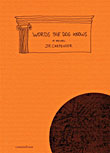So two fiction writers walk into a bar. That’s not the opening line of a joke, that’s just what fiction writers do. They walk into a bar. Now if they haven’t slept with each other yet they might engage in some witty flirting. If they have slept with each other already or are sleeping with a friend of a friend or secretly hate each other or each other’s writing or have written reviews of each other’s work, some awkward editorializing might be required. But basically, two fiction writers walk into a bar, they drink an alarming amount, there’s chemistry or there’s competition, and eventually one will turn to the other and ask: So, who have you been reading lately?
In January 2006 Mike Bryson, editor of the Toronto-based web journal
The Danforth Review, asked 27 Canadian writers what curriculum they would bring to class, if they were asked to teach an introductory level course,
The Short Story 101. I’ve never taken an introductory level course on the short story let alone taught one, so I don’t know what makes a good curriculum. Not all of the 27 lists listed on TDR read like curriculum. Some seem like maybe they were compiled to impress fiction writers in bars. But maybe that’s just me.
I used to hate to read short stories. Then I found out I write very short stories, which isn’t quite the same. Anyone signing up for "The Very Short Story 101" would probably be better off just reading poetry. Chances are I’ll never be an English teacher, not with that attitude. But the next time I walk into a bar with a fiction writer, here are some of the authors, stories, or groups of stories that I’ll try and squeeze into the conversation:
Franz Kafka, "The Metamorphoses"
Isaac Babel, "Red Calvary"
Gogol, "The Overcoat"
Chekov, "The Kiss"
James Joyce, "The Dead"
Angela Carter, "The Bloody Chamber"
Haruki Murakami, "The Elephant Vanishes"
Flannery O’Connor, "A Good Man is Hard to Find"
Grace Paley, "The Small Disturbances of Man"
Cynthia Ozick, "The Shawl"
Amy Hempel, "In the Cemetery Where Al Jolson is Buried"
Barbara Gowdy, "We so Seldom Look on Love"
Anne Carson, "Short Talks"
Lydia Davis, "Almost No Memory"
Mark Richard, "Strays"
Joy Williams, "Honored Guest"
Ron Carlson, "Towel Season"
Lisa Moore, "Open"
Greg Hollingshead, "The Roaring Girl"
So, who have you been reading lately?
. . . . .
Labels: reading, writing



